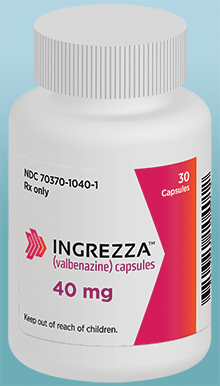FDA Approves First Medication to Treat Tardive Dyskinesia
Abstract
The decision was based in part on a trial that found that patients who took Ingrezza for six weeks experienced a reduction in abnormal movements, with few side effects.
Last week, the Food and Drug Administration (FDA) approved Ingrezza (valbenazine) capsules to treat adults with tardive dyskinesia (TD)—a serious side effect associated with chronic use of antipsychotics. Ingrezza, a novel and highly selective vesicular monoamine transporter 2 (VMAT2) inhibitor, is the first and only FDA-approved product for this condition.

By some estimates, 20 percent to 30 percent of patients with chronic exposure to antipsychotics develop TD, which is characterized by repetitive involuntary movements.
“Tardive dyskinesia can be disabling and can further stigmatize patients with mental illness,” said Mitchell Mathis, M.D., director of the Division of Psychiatry Products in the FDA’s Center for Drug Evaluation and Research, in a press release. “Approving the first drug for the treatment of tardive dyskinesia is an important advance for patients suffering with this condition.”
The approval of Ingrezza was based in part on the results of a study published March 21 in AJP in Advance. The study—which was led by Robert Hauser, M.D., M.B.A., of the University of South Florida—compared changes in involuntary movements in 234 patients with moderate-to-severe TD who took valbenazine (40 mg/day or 80 mg/day) or placebo daily for six weeks. Approximately 65 percent of participants had schizophrenia or schizoaffective disorder, and 85.5 percent were receiving concomitant antipsychotics.
The researchers compared change from baseline in dyskinesia scores on the Abnormal Involuntary Movement Scale (AIMS, items 1–7) at two, four, and six weeks.
A total of 205 patients completed the study. The mean change from baseline to week six of the AIMS dyskinesia score was −3.2 for the 80 mg/day group, compared with −0.1 for the placebo group, a significant difference. The mean AIMS dyskinesia score was also reduced in the 40 mg/day group (−1.9 compared with −0.1).
The study found Ingrezza to be generally well tolerated. Somnolence, akathisia, and dry mouth were reported by 5.3 percent, 3.3 percent, and 3.3 percent of patients in both dosage groups, respectively.
Additionally, the FDA noted that “Ingrezza may cause serious side effects including sleepiness and heart rhythm problems (QT prolongation). Its use should be avoided in patients with congenital long QT syndrome or with abnormal heartbeats associated with a prolonged QT interval. Those taking Ingrezza should not drive or operate heavy machinery or do other dangerous activities until it is known how the drug affects them.”
Jeffrey Lieberman, M.D., chair of psychiatry at Columbia University College of Physicians and Surgeons, director of the New York State Psychiatric Institute, and a former APA president, said he “welcomes the introduction of this innovative therapy for reducing a serious neurologic side effect of chronic antipsychotic drug [APD] treatment. However, I would hope and expect that the need for it will decline as the frequency of TD diminishes with the use of newer medications and limiting cumulative APD exposure.”
Additional prescribing information on Ingrezza can be accessed here. ■



